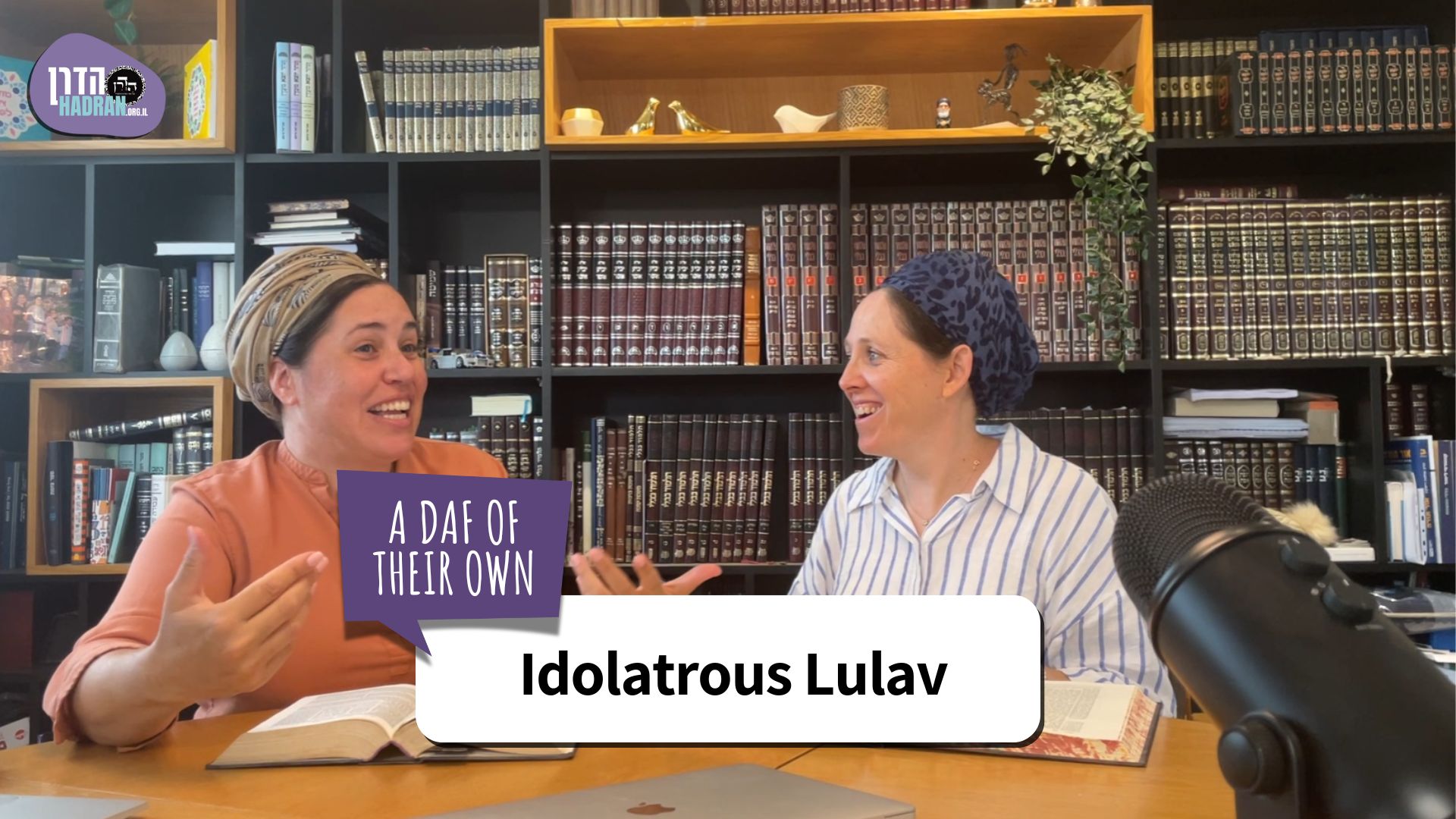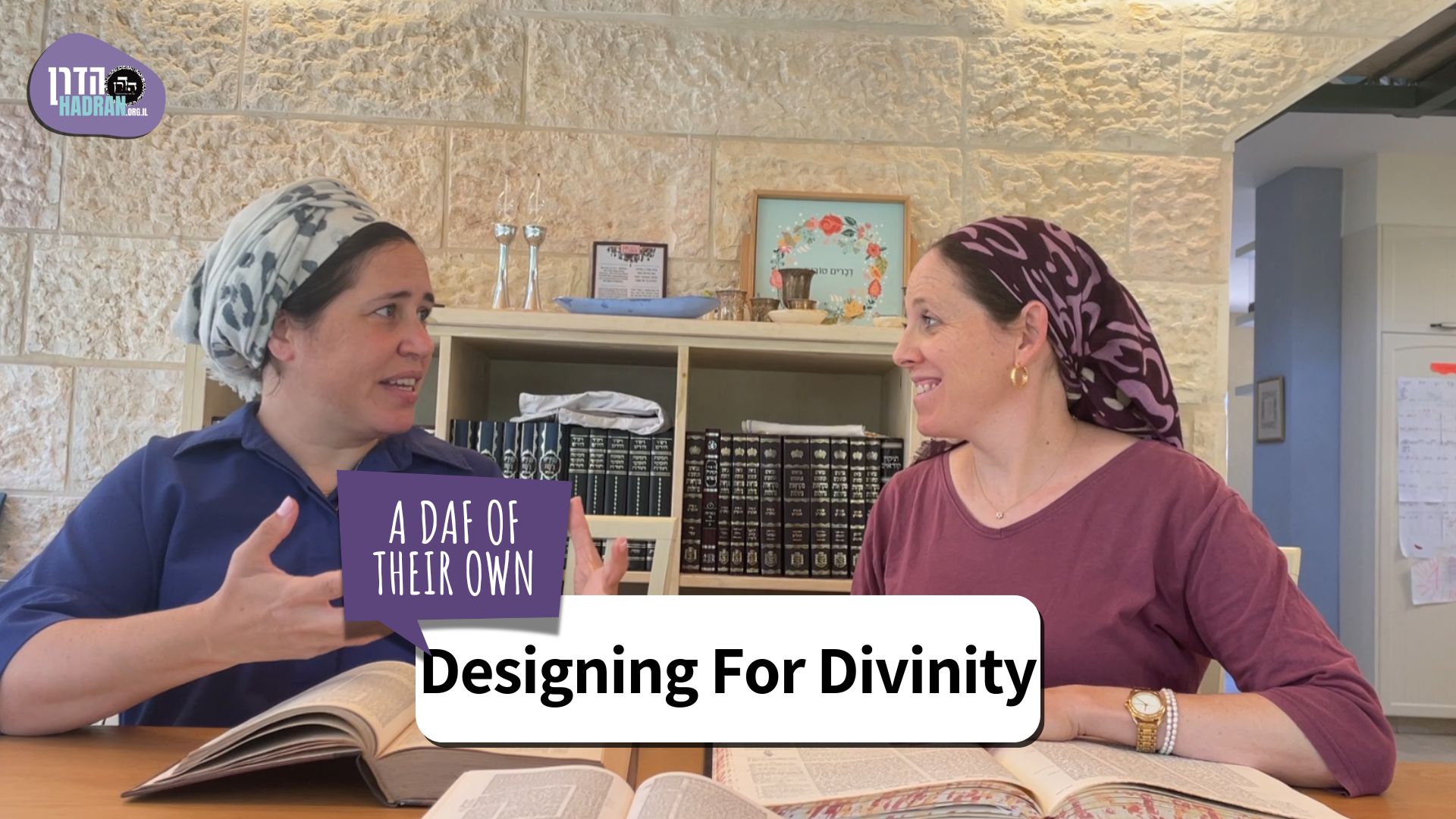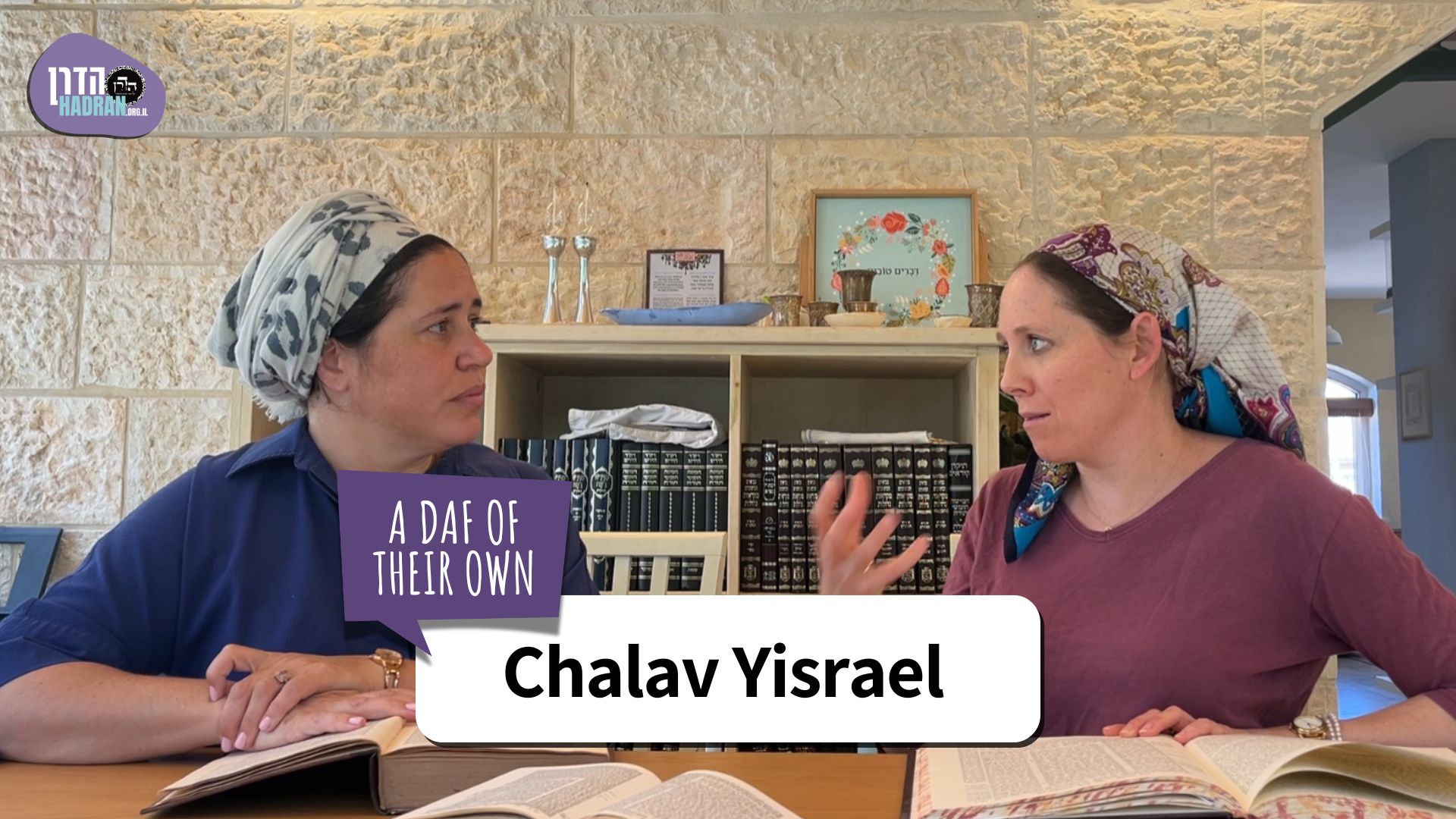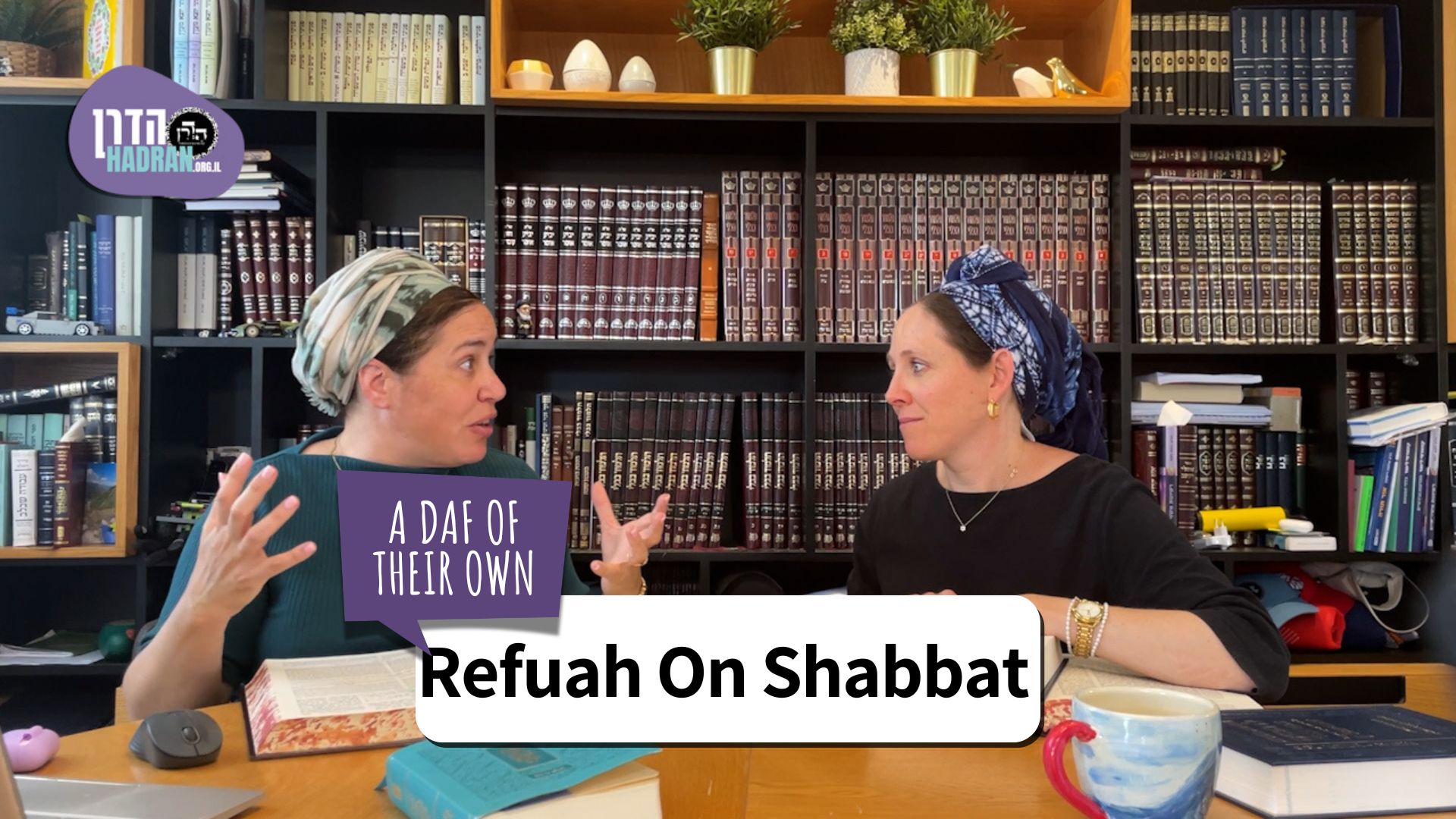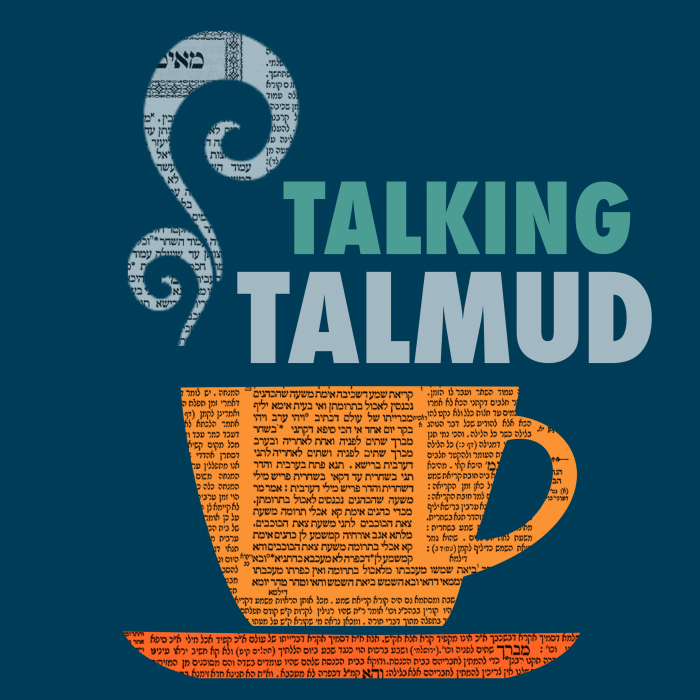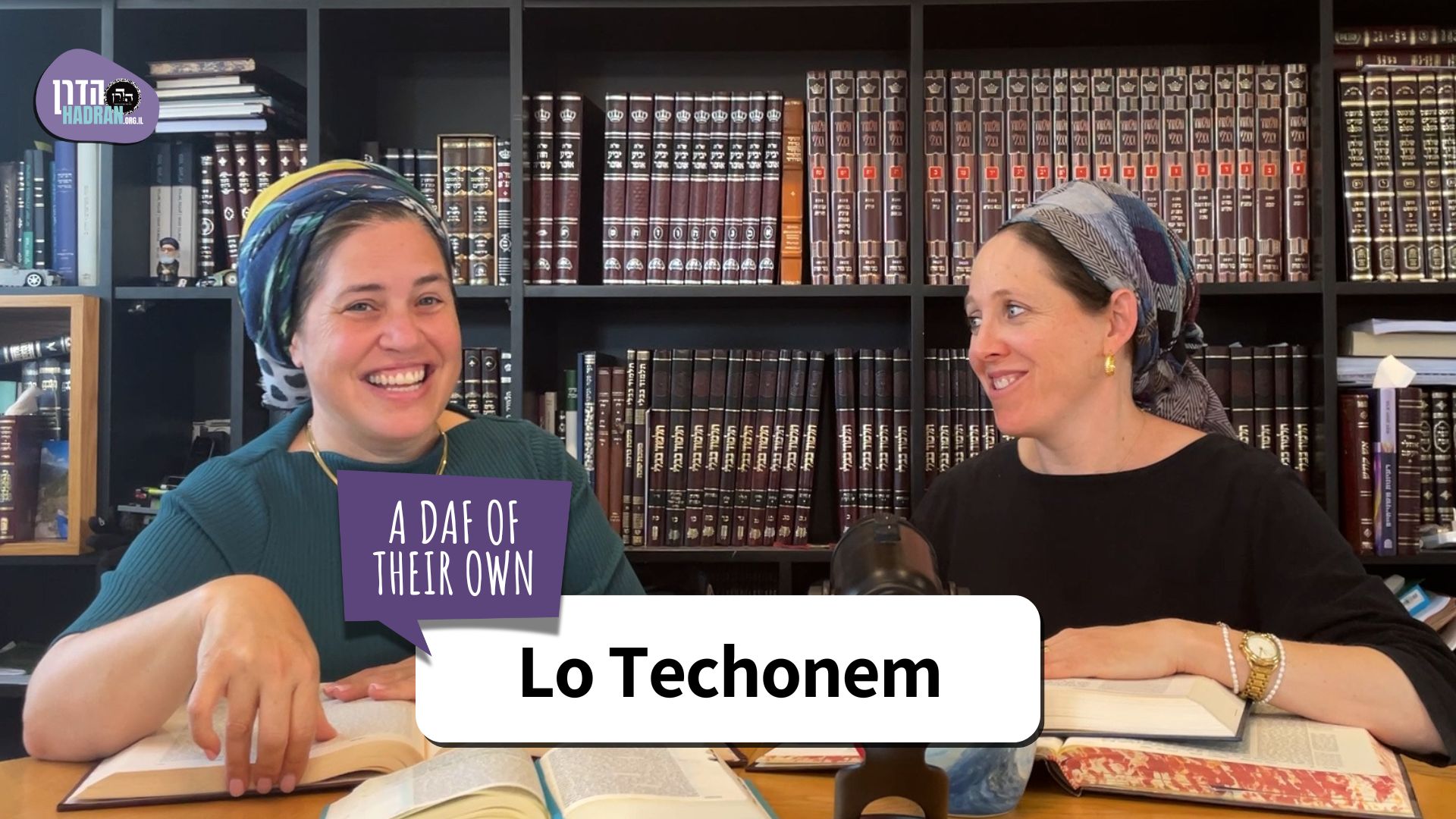Avodah Zarah 24
בְּשִׁשִּׁים רִבּוֹא שָׂכָר, רַב כָּהֲנָא מַתְנֵי בִּשְׁמוֹנִים רִבּוֹא, וְהָיוּ מַפְתְּחוֹת מוּנָּחוֹת תַּחַת מְרַאֲשׁוֹתָיו שֶׁל אָבִיו, וְלֹא צַּעֲרוֹ.
for six hundred thousand gold dinars’ profit, and Rav Kahana teaches that it was eight hundred thousand dinars’ profit. But the keys to the chest holding the jewels were placed under his father’s head, and he would not disturb him. It is evident from this story that the stones of the ephod may be purchased from gentiles. If so, Rabbi Eliezer’s reasoning cannot be based on Numbers 19:2, as an identical phrase appears in Exodus 25:2, and yet contributions to the Tabernacle may be accepted from gentiles.
״אַבְנֵי שֹׁהַם״ הִפְסִיק הָעִנְיָן, וְהָא ״וְאַבְנֵי מִלּוּאִים״ כְּתִיב, דַּהֲדַר עָרְבֵיהּ!
The Gemara answers that the phrase “onyx stones” (Exodus 25:7) concluded discussion of that matter. In other words, almost all the items listed in Exodus, chapter 25, for the contributions to the Tabernacle, are joined by the conjunction “and.” Before the verse mentions the stones for the ephod, it states “onyx stones,” without the conjunction “and.” This omission serves to disconnect these stones from the earlier phrase: “That they take” (Exodus 25:2), which means that the disqualification of items purchased from gentiles for use in the Temple derived from this phrase does not apply to the items listed after that point, including the stones of the ephod. The Gemara asks: But isn’t it subsequently written: “And stones to be set,” by which the verse goes back and combines the list, so that the earlier verse applies once more? Accordingly, it should be prohibited to purchase any of the items listed in the verse from gentiles.
וְעוֹד, קָתָנֵי סֵיפָא: לְשָׁנָה אַחֶרֶת נוֹלְדָה לוֹ פָּרָה אֲדוּמָּה בְּעֶדְרוֹ, נִכְנְסוּ חַכְמֵי יִשְׂרָאֵל אֶצְלוֹ. אָמַר לָהֶם: יוֹדֵעַ אֲנִי בָּכֶם שֶׁאִם אֲנִי מְבַקֵּשׁ מִכֶּם כׇּל מָמוֹן שֶׁבָּעוֹלָם אַתֶּם נוֹתְנִין לִי, עַכְשָׁיו אֵינִי מְבַקֵּשׁ מִכֶּם אֶלָּא אוֹתוֹ מָמוֹן שֶׁהִפְסַדְתִּי בִּשְׁבִיל אַבָּא.
The Gemara adds: And furthermore, the latter clause teaches: In a subsequent year, a red heifer was born in Dama’s herd and the Sages of Israel approached him, seeking to purchase the heifer. Dama said to them: I know concerning you that if I were to ask from you all the money in the world, you would give it to me. Now I am requesting from you only that amount of money which I lost by refraining from waking my father. This latter clause explicitly states that the Sages intended to purchase a red heifer from a gentile, which contradicts the ruling of Rabbi Eliezer.
הָתָם, עַל יְדֵי תַּגָּרֵי יִשְׂרָאֵל זְבוּן.
The Gemara answers: There, it was through the agency of Jewish merchants that they purchased the heifer. In other words, Jewish merchants purchased the heifer from Dama ben Netina, after which the Sages acquired the animal from the merchants to be used as a red heifer of purification. In this manner, the animal was purchased for the purpose of an offering from Jews.
וְרַבִּי אֱלִיעֶזֶר לָא חָיֵישׁ לִרְבִיעָה?
According to Sheila, Rabbi Eliezer’s reason for not allowing a red heifer to be purchased from gentiles is based on a derivation from a verse rather than a concern that a person may have engaged in bestiality with it. The Gemara therefore asks: And is Rabbi Eliezer not concerned about the possibility that a person has engaged in bestiality with the animal?
וְהָתַנְיָא, אָמְרוּ לוֹ לְרַבִּי אֱלִיעֶזֶר: מַעֲשֶׂה וּלְקָחוּהָ מִן הַגּוֹי, וְדָמָא שְׁמוֹ, וְאָמְרִי לַהּ רֶמֶץ שְׁמוֹ. אָמַר לָהֶן רַבִּי אֱלִיעֶזֶר: מִשָּׁם רְאָיָה? יִשְׂרָאֵל הָיוּ מְשַׁמְּרִין אוֹתָהּ מִשָּׁעָה שֶׁנּוֹלְדָה! רַבִּי אֱלִיעֶזֶר תַּרְתֵּי אִית לֵיהּ: קִיחָה, וְחָיֵישׁ נָמֵי לִרְבִיעָה.
The Gemara elaborates: But isn’t it taught in a baraita that the Rabbis who hold that the heifer may be purchased from a gentile said to Rabbi Eliezer: There was an incident in which Jews purchased the red heifer from a gentile, and Dama was his name. And some say Remetz was his name. In response to this claim, Rabbi Eliezer said to them: Can one bring a proof from there? Certainly not, as Jews were safeguarding it from the time that it was born, to ensure that a person did not engage in bestiality with it. Contrary to the opinion of Sheila, it is evident from here that Rabbi Eliezer was concerned about this possibility. The Gemara explains that Rabbi Eliezer has two requirements: The purchase of the red heifer must be from a Jew, and he is also concerned about the possibility that a person had engaged in bestiality with the animal.
אָמַר מָר: יִשְׂרָאֵל הָיוּ מְשַׁמְּרִין אוֹתָהּ מִשָּׁעָה שֶׁנּוֹלְדָה. וְנֵיחוּשׁ דִּלְמָא רָבְעִי לְאִמַּהּ כִּי הֲוָה מְעַבְּרָה! דְּאָמַר רָבָא: וְולַד הַנּוֹגַחַת אֲסוּרָה — הִיא וּוְלָדָהּ נָגְחוּ, וְולַד הַנִּרְבַּעַת אֲסוּרָה — הִיא וּוְלָדָהּ נִרְבְּעוּ. אֵימָא: יִשְׂרָאֵל הָיוּ מְשַׁמְּרִין אוֹתָהּ מִשָּׁעָה שֶׁנּוֹצְרָה.
The Gemara analyzes Rabbi Eliezer’s statement. The Master said: Jews were safeguarding the red heifer purchased from Dama ben Netina from the time that it was born. The Gemara asks: And let us be concerned that perhaps gentiles engaged in bestiality with the mother while she was pregnant, as Rava says: The offspring of an animal that gored and killed a Jew is forbidden as an offering, as it is considered as if she and her offspring together gored. And similarly, the offspring of an animal that was the object of bestiality is forbidden because it is considered as if a person engaged in bestiality with both her and her offspring. The Gemara answers: Say that Rabbi Eliezer meant that Jews were safeguarding it from the time that it was conceived.
וְנֵיחוּשׁ דִּלְמָא רַבְעוּהָ לְאִמַּהּ מֵעִיקָּרָא! דִּתְנַן: כׇּל הַפְּסוּלִין לְגַבֵּי מִזְבֵּחַ — וַלְדוֹתֵיהֶן מוּתָּרִין, וְתָנֵי עֲלַהּ: רַבִּי אֱלִיעֶזֶר אוֹסֵר.
The Gemara asks: And let us be concerned that perhaps they engaged in bestiality with the mother from the outset, i.e., before conception, as we learned in a mishna (Temura 30b): With regard to all animals that are disqualified for the altar, such as one that was the object of bestiality, sacrifice of their offspring is permitted; and it is taught with regard to this case that Rabbi Eliezer prohibits their offspring from being sacrificed on the altar. If this is the case, Rabbi Eliezer should agree that there is a concern that a person might have engaged in bestiality with the heifer’s mother at some point before its birth.
הָנִיחָא לְרָבָא, דְּאָמַר רָבָא אָמַר רַב נַחְמָן: מַחְלוֹקֶת כְּשֶׁנִּרְבְּעוּ כְּשֶׁהֵן מוּקְדָּשִׁין, אֲבָל כְּשֶׁהֵן חוּלִּין — דִּבְרֵי הַכֹּל מוּתָּרִין.
The Gemara clarifies the difficulty: Granted, this works out well according to the opinion of Rava, as Rava says that Rav Naḥman says: The dispute between the Rabbis and Rabbi Eliezer applies only when a person engaged in bestiality with the animals when they were consecrated and then they conceived, as Rabbi Eliezer holds that in that case the offspring are disqualified from being sacrificed as offerings; but if someone engaged in bestiality with the animals when they were non-sacred, everyone agrees that the offspring are permitted. Accordingly, it needs to be ascertained only that no one engaged in bestiality with the mother after she was consecrated.
אֶלָּא לְרַב הוּנָא בַּר חִינָּנָא אָמַר רַב נַחְמָן: מַחְלוֹקֶת כְּשֶׁנִּרְבְּעוּ כְּשֶׁהֵן חוּלִּין, אֲבָל כְּשֶׁהֵן מוּקְדָּשִׁין — דִּבְרֵי הַכֹּל אֲסוּרִין, מַאי אִיכָּא לְמֵימַר?
But according to the opinion of Rav Huna bar Ḥinnana, who says that Rav Naḥman says: The dispute applies only when a person engaged in bestiality with the animals when they were non-sacred, but if someone engaged in bestiality with them when they were consecrated, everyone agrees that the offspring are forbidden, what is there to say? According to this opinion, Rabbi Eliezer should be concerned that a person might have engaged in bestiality with the animal prior to conception.
אֵימָא: יִשְׂרָאֵל הָיוּ מְשַׁמְּרִין אוֹתָהּ לְאִמָּהּ מִשָּׁעָה שֶׁנּוֹצְרָה. וְנֵיחוּשׁ דִּילְמָא רַבְעוּהָ לְאִמָּא דְּאִמַּהּ! כּוּלֵּי הַאי לָא חָיְישִׁינַן.
The Gemara answers: Say that Jews were safeguarding it as well, i.e., the mother of the red heifer, from the time that it was conceived. The Gemara challenges: And let us be concerned that perhaps someone engaged in bestiality with the mother of the heifer’s mother. The Gemara responds: We are not concerned to such an extent.
אָמַר מָר: יִשְׂרָאֵל הָיוּ מְשַׁמְּרִין אוֹתָהּ מִשָּׁעָה שֶׁנּוֹצְרָה. מְנָא יָדְעִינַן? אָמַר רַב כָּהֲנָא: כּוֹס אָדוֹם מַעֲבִירִין לְפָנֶיהָ בְּשָׁעָה שֶׁעוֹלֶה עָלֶיהָ זָכָר.
The Gemara discusses the revised version of Rabbi Eliezer’s statement. The Master said above: Jews were safeguarding the red heifer from the time that it was conceived. The Gemara asks: From where do we know that the mother would give birth to a red heifer, which would warrant safeguarding her? Rav Kahana says: They would pass a red cup before her while the male mounts her, an act that would cause the offspring to be red.
אִי הָכִי, אַמַּאי דָּמֶיהָ יְקָרִין? הוֹאִיל וּשְׁתֵּי שְׂעָרוֹת פּוֹסְלוֹת בָּהּ. וּמַאי שְׁנָא דִּידְהוּ? אָמַר רַב כָּהֲנָא: בְּמוּחְזֶקֶת.
The Gemara asks: If that is so, and the birth of a red heifer can be induced in such a simple manner, why is its price so expensive? The Gemara answers: Since two hairs of a different color render the red heifer unfit, this method is unreliable. The Gemara asks another question: And what is different about these cows? Why did the Jews resort to purchasing the red heifer from a gentile when they could have induced its conception themselves? Rav Kahana said: Dama ben Netina owned a herd of cattle that were known to beget red heifers, and therefore they preferred to employ the aforementioned method with one of his cows.
יָתֵיב רַבִּי אַמֵּי וְרַבִּי יִצְחָק נַפָּחָא אַקִּלְעָא דְּרַבִּי יִצְחָק נַפָּחָא, פְּתַח חַד מִינַּיְיהוּ וַאֲמַר: וְכֵן הָיָה רַבִּי אֱלִיעֶזֶר פּוֹסֵל בְּכׇל הַקָּרְבָּנוֹת כּוּלָּן.
§ The Gemara relates: Rabbi Ami and Rabbi Yitzḥak Nappaḥa were sitting on Rabbi Yitzḥak Nappaḥa’s porch. One of them began and said that the baraita teaches: And, similarly, Rabbi Eliezer would disqualify all offerings purchased from gentiles, due to the concern that a person had engaged in bestiality with the animals.
פְּתַח אִידַּךְ מִינַּיְיהוּ וְאָמַר: מַאי אוֹתִיבוּ לֵיהּ חַבְרוֹהִי לְרַבִּי אֱלִיעֶזֶר? ״כׇּל צֹאן קֵדָר יִקָּבְצוּ לָךְ וְגוֹ׳״! אָמַר לָהֶן רַבִּי אֱלִיעֶזֶר: כּוּלָּם גֵּרִים גְּרוּרִים הֵם לֶעָתִיד לָבֹא.
The other one of them began and said: What did Rabbi Eliezer’s colleagues respond to him? They quoted the verse: “All flocks of Kedar shall be gathered together unto you, the rams of Nebaioth shall minister unto you; they shall come up with acceptance upon My altar” (Isaiah 60:7). This verse clearly indicates that offerings will be accepted from gentiles. Rabbi Eliezer said to them: In the future all gentiles will be calculating converts, i.e., those who converted for personal gain, and as converts, they will not be suspected of engaging in bestiality.
אָמַר רַב יוֹסֵף: מַאי קְרָא? ״כִּי אָז אֶהְפֹּךְ אֶל עַמִּים שָׂפָה בְרוּרָה וְגוֹ׳״. אֲמַר לֵיהּ אַבָּיֵי: וְדִלְמָא מֵעֲבוֹדָה זָרָה הוּא דַּהֲדוּר בְּהוּ? אֲמַר לֵיהּ רַב יוֹסֵף: ״לְעׇבְדוֹ שְׁכֶם אֶחָד״ כְּתִיב.
Rav Yosef said: What is the verse from which it is derived that they will convert? The verse states: “For then will I turn to the peoples a pure language, that they may all call upon the name of the Lord, to serve Him with one consent” (Zephaniah 3:9). This verse indicates that all nations will worship God. Abaye said to him: But perhaps it is only from idol worship that they will withdraw, while they will still engage in forbidden sexual relations, including bestiality? Rav Yosef said to him: That cannot be, as it is written at the conclusion of the verse: “To serve Him with one consent,” which indicates that the gentiles will accept all of God’s mitzvot.
רַב פָּפָּא מַתְנֵי הָכִי, וְרַב זְבִיד מַתְנֵי הָכִי, וְתַרְוַיְיהוּ אָמְרִי: וְכֵן הָיָה רַבִּי אֱלִיעֶזֶר פּוֹסֵל בְּכׇל הַקָּרְבָּנוֹת, וְתַרְוַיְיהוּ אָמְרִי: וּמַאי אוֹתִיבוּ לֵיהּ חַבְרוֹהִי לְרַבִּי אֱלִיעֶזֶר? ״כׇּל צֹאן קֵדָר יִקָּבְצוּ לָךְ וְגוֹ׳״, אָמַר רַבִּי אֱלִיעֶזֶר: כּוּלָּם גֵּרִים גְּרוּרִים הֵם לֶעָתִיד לָבֹא.
The Gemara comments: Rav Pappa teaches that discussion in this manner, but Rav Zevid teaches it in this manner: Both Rabbi Ami and Rabbi Yitzḥak Nappaḥa said: And similarly, Rabbi Eliezer would disqualify all offerings taken from gentiles. And both said: What did Rabbi Eliezer’s colleagues respond to him? They quoted the verse: “All flocks of Kedar shall be gathered together unto you, the rams of Nebaioth shall minister unto you; they shall come up with acceptance upon My altar.” Rabbi Eliezer said to them: All gentiles will be calculating converts in the future.
וּמַאי קְרָאָה? ״כִּי אָז אֶהְפֹּךְ אֶל עַמִּים שָׂפָה בְרוּרָה לִקְרֹא כֻלָּם בְּשֵׁם ה׳״. מַתְקֵיף לַהּ רַב יוֹסֵף: וְדִלְמָא מֵעֲבוֹדָה זָרָה הוּא דְּהָדְרִי בְּהוּ? אֲמַר לֵיהּ אַבָּיֵי: ״לְעׇבְדוֹ שְׁכֶם אֶחָד״ כְּתִיב.
Rabbi Eliezer continues: And what is the verse from which it is derived that they will convert? It is from the verse: “For then will I turn to the peoples a pure language, that they may all call upon the name of the Lord, to serve him with one consent.” Rav Yosef objects to this proof: But perhaps it is only from idol worship that they will withdraw? Abaye said to him: That cannot be, as it is written: “To serve Him with one consent.”
מֵיתִיבִי: ״וַיֹּאמֶר מֹשֶׁה גַּם אַתָּה תִּתֵּן בְּיָדֵנוּ זְבָחִים וְעֹלֹת״! קוֹדֶם מַתַּן תּוֹרָה שָׁאנֵי.
§ The Gemara cites a series of verses which present difficulties with regard to the claim that animals purchased from gentiles may not be used as offerings. The Gemara raises an objection from the following verse: “And Moses said: You must also give into our hand offerings and burnt-offerings that we may sacrifice unto the Lord our God” (Exodus 10:25). Moses demanded that Pharaoh provide the Jews with offerings, despite the fact that he was a gentile. The Gemara explains: The halakha prior to the giving of the Torah was different, as at that time it was acceptable to use animals taken from gentiles as offerings.
תָּא שְׁמַע: ״וַיִּקַּח יִתְרוֹ חֹתֵן מֹשֶׁה עֹלָה וּזְבָחִים לֵאלֹהִים״! יִתְרוֹ נָמֵי קוֹדֶם מַתַּן תּוֹרָה הֲוָה. הָנִיחָא לְמַאן דְּאָמַר: יִתְרוֹ קוֹדֶם מַתַּן תּוֹרָה הֲוָה, אֶלָּא לְמַאן דְּאָמַר:
The Gemara raises another objection: Come and hear a proof from the verse: “And Yitro, Moses’ father-in-law, took a burnt-offering and offerings for God” (Exodus 18:12). Yitro was not a Jew, and yet he brought offerings for God. The Gemara answers: The incident with Yitro was also prior to the giving of the Torah. The Gemara observes: Granted, this works out well according to the one who says that the incident with Yitro was prior to the giving of the Torah. But according to the one who says that
יִתְרוֹ לְאַחַר מַתַּן תּוֹרָה הֲוָה, מַאי אִיכָּא לְמֵימַר? אֶלָּא, יִתְרוֹ מִיִּשְׂרָאֵל זְבַן.
the incident involving Yitro was after the giving of the Torah, what is there to say? How could they accept offerings from him? Rather, it must be that Yitro purchased the animals from a Jew.
תָּא שְׁמַע: ״וַיֹּאמֶר שָׁאוּל מֵעֲמָלֵקִי הֱבִיאוּם אֲשֶׁר חָמַל הָעָם עַל מֵיטַב הַצֹּאן וְהַבָּקָר (הַמִּשְׁנִים וְהַכָּרִים וְעַל כׇּל הַצֹּאן) לְמַעַן זְבֹחַ לַה׳ אֱלֹהֶיךָ״! מַאי ״מֵיטַב״? דְּמֵי מֵיטָב.
The Gemara further states: Come and hear another objection from a verse: “And Saul said: They have brought them from the Amalekites; for the people spared the best of the flock and of the herd, to sacrifice unto the Lord your God” (I Samuel 15:15). The verse states explicitly that the Israelites intended to sacrifice animals previously owned by gentiles. The Gemara explains: What is the meaning of the phrase: “The best”? This is referring to the monetary value of the best livestock. The intention was not to sacrifice the animals themselves, but to sell them and use the proceeds of the sale to purchase other animals to sacrifice as offerings.
וּמַאי שְׁנָא מֵיטָב? כִּי הֵיכִי דְּלִיקְפֹּץ עֲלַיְהוּ זָבֹינָא.
The Gemara inquires: And what is different about the best animals? If the animals were sold for their value, why sell those animals in particular, rather than several inferior-quality animals? The Gemara explains that they did so in order that buyers would jump at the opportunity to buy superior-quality livestock. In other words, it is easier to sell one superior-quality animal than several inferior-quality ones.
תָּא שְׁמַע: ״וַיֹּאמֶר אֲרַוְנָה אֶל דָּוִד יִקַּח וְיַעַל אֲדֹנִי הַמֶּלֶךְ (אֶת) הַטּוֹב בְּעֵינוֹ (וְאֶת) [רְאֵה] הַבָּקָר לָעֹלָה וְהַמֹּרִגִּים וּכְלֵי הַבָּקָר לָעֵצִים״! אָמַר רַב נַחְמָן: אֲרַוְנָה גֵּר תּוֹשָׁב הָיָה.
Come and hear another objection from a verse: “And Araunah said unto David: Let my lord the king take and offer up what seems good unto him; behold the cattle for the burnt-offering, and the threshing instruments [morigim] and the accoutrements of the cattle for the wood” (II Samuel 24:22). Apparently, David was willing to accept oxen as offerings from a gentile. Rav Naḥman says: Araunah was a gentile who resided in Eretz Yisrael and observed the seven Noahide mitzvot [ger toshav]. The seven Noahide mitzvot include the prohibition against engaging in bestiality, and therefore Araunah was not suspected of this practice.
מַאי מוֹרִגִּים? אָמַר עוּלָּא: מִטָּה שֶׁל טוּרְבִּיל. מַאי מִטָּה שֶׁל טוּרְבִּיל? עִיזָּא דְּקוּרְקְסָא דְּדָיְישָׁן. אָמַר רַב יוֹסֵף: מַאי קְרָא? ״הִנֵּה שַׂמְתִּיךְ לְמוֹרַג חָרוּץ חָדָשׁ בַּעַל פִּיפִיּוֹת תָּדוּשׁ הָרִים וְתָדֹק וּגְבָעוֹת כַּמֹּץ תָּשִׂים״.
Tangentially, the Gemara asks: What is the meaning of the term “morigim,” mentioned in this verse? Ulla said: It is a turbil bed. The Gemara asks: What is a turbil bed? It is a serrated board [kurkesa] used for threshing. Rav Yosef said: What is the verse from which the meaning of morigim is derived? It is derived from the verse: “Behold, I have made you a new threshing board [morag] having sharp teeth; you shall thresh the mountains, and beat them small, and shall make the hills as chaff” (Isaiah 41:15).
מֵיתִיבִי: ״וְאֶת הַפָּרוֹת הֶעֱלוּ עֹלָה לַה׳״! הוֹרָאַת שָׁעָה הָיְתָה.
The Gemara raises an objection to the opinion of Rabbi Eliezer. After the Philistines returned the Ark of the Covenant to the Israelites upon a cart drawn by cattle, the verse states: “And they sacrificed the cattle as a burnt-offering unto the Lord” (I Samuel 6:14). Evidently, the Jews did not hesitate to sacrifice the Philistines’ animals. The Gemara explains: There, it was a provisional edict issued in extraordinary circumstances, and their actions are not representative of the general halakha.
הָכִי נָמֵי מִסְתַּבְּרָא, דְּאִי לָא תֵּימָא הָכִי, עוֹלָה נְקֵבָה מִי אִיכָּא?
The Gemara adds: This also stands to reason, as, if you do not say so, one can raise a further difficulty with this episode: Is there a female burnt-offering? Only males may be sacrificed as burnt-offerings. Since the Jews sacrificed the cows as burnt-offerings, it is clear that they were acting unconventionally due to extenuating circumstances.
וּמַאי קוּשְׁיָא? דִּלְמָא בְּבָמַת יָחִיד, וְכִדְרַב אַדָּא בַּר אַהֲבָה, דְּאָמַר רַב אַדָּא בַּר אַהֲבָה: מִנַּיִן לְעוֹלָה נְקֵבָה שֶׁהִיא כְּשֵׁרָה בְּבָמַת יָחִיד? שֶׁנֶּאֱמַר: ״וַיִּקַּח שְׁמוּאֵל טְלֵה חָלָב אֶחָד וַיַּעֲלֵהוּ עוֹלָה״.
The Gemara rejects this proof: And what is the difficulty? In other words, the additional problem with the incident, that the animals were female, which is cited as proof that there were extenuating circumstances, is not in fact difficult at all. The Gemara elaborates: Perhaps the cows were offered upon a private altar, and this is in accordance with the opinion of Rav Adda bar Ahava, as Rav Adda bar Ahava says: From where is it derived that a female burnt-offering is fit to be sacrificed upon a private altar? As it is stated: “And Samuel took a milking lamb, and sacrificed it [vaya’alehu] for a burnt-offering unto the Lord” (I Samuel 7:9). The phrase “milking lamb” indicates that it was a female, and yet Samuel sacrificed it upon a private altar.
״וַיַּעֲלֵהוּ״ — זָכָר מַשְׁמַע! אָמַר רַב נַחְמָן בַּר יִצְחָק: ״וַיַּעֲלֶהָ״ כְּתִיב.
The Gemara raises a difficulty: But the word vaya’alehu is masculine, which means that the lamb was a male. Rav Naḥman bar Yitzḥak says: Although the word is read in the masculine, it is written in the feminine form, vaya’alah, which teaches that even a female lamb may be sacrificed on a private altar.
רַבִּי יוֹחָנָן אָמַר: גְּבוּל יֵשׁ לָהּ, פְּחוּתָה מִבַּת שָׁלֹשׁ שָׁנִים — נֶעֱקֶרֶת, בַּת שָׁלֹשׁ שָׁנִים — אֵינָהּ נֶעֱקֶרֶת.
§ After concluding its discussion of the opinion of Rabbi Eliezer, the Gemara cites another resolution of the contradiction between the mishna and the baraita. Rabbi Yoḥanan says: There is a clear demarcation in the case of an animal with whom a man engaged in bestiality. If she is less than three years old, she becomes barren as a result of penetration, but if she is already three years old, she does not become barren. Although gentiles are generally suspected of engaging in bestiality, the baraita rules that an animal that is less than three years old may be used as an offering because a gentile will refrain from engaging in bestiality with an animal that may become barren as a result of his actions.
אֵיתִיבֵיהּ כֹּל הָנֵי תְּיוּבָתָא, שַׁנִּי לְהוּ: פְּחוּתָה מִבַּת שָׁלֹשׁ שָׁנִים. תָּא שְׁמַע: ״וְאֶת הַפָּרוֹת הֶעֱלוּ עֹלָה לַה׳״ — בִּפְחוּתָה מִבַּת שָׁלֹשׁ שָׁנִים.
They raised all of those refutations from the aforementioned verses which indicate that animals purchased from gentiles may be brought as offerings, and he answered them by claiming that the animals being offered were less than three years old. The Gemara reexamines one of the objections. Come and hear, as the verse states: “And they sacrificed the cattle as a burnt-offering unto the Lord” (I Samuel 6:14). Rabbi Yoḥanan explained that although in that incident the cattle had been owned by Philistines, they were less than three years old, and it was therefore presumed that the Philistines had not engaged in bestiality with them.
מַתְקֵיף לַהּ רַב הוּנָא בְּרֵיהּ דְּרַב נָתָן: אִם כֵּן, הַיְינוּ ״וְאֶת בְּנֵיהֶם כָּלוּ בַבָּיִת״ — פְּחוּתָה מִבַּת שָׁלֹשׁ שָׁנִים?
The Gemara cites a refutation of Rabbi Yoḥanan’s answer: Rav Huna, son of Rabbi Natan, objects to this: If so, then this is also true with regard to the verse: “And they took two nursing cows and tied them to the cart and shut up their calves at home” (I Samuel 6:10). According to Rabbi Yoḥanan, the verse is necessarily referring to cows that are less than three years old.
וּפְחוּתָה מִבַּת שָׁלֹשׁ שָׁנִים מִי קָא יָלְדָה? וְהָתַנְיָא: פָּרָה וַחֲמוֹר מִבַּת שָׁלֹשׁ — וַדַּאי לַכֹּהֵן, מִכָּאן וְאֵילָךְ — סָפֵק. אֶלָּא מְחַוַּורְתָּא כִּדְשַׁנִּין מֵעִיקָּרָא.
And can a cow that is less than three years old give birth? But isn’t it taught in a baraita: With regard to a cow or a donkey purchased from a gentile when they were less than three years old, the first of their offspring born after the purchase is certainly reserved for the priest, who is entitled to the firstborn of a cow or donkey owned by a Jew. From this point forward, i.e., if they were older than three years at the time of the sale, it is uncertain whether or not the offspring is the firstborn. This indicates that an animal does not bear offspring within the first three years of its life. Since the cows in the verse had already given birth, they could not have been less than three years old, as Rabbi Yoḥanan claimed. The Gemara concludes: Rather, it is clear as we initially answered, i.e., Rabbi Yoḥanan’s suggestion is rejected, and the actions in that verse were due to a provisional edict.
״וַיִּשַּׁרְנָה הַפָּרוֹת בַּדֶּרֶךְ עַל דֶּרֶךְ בֵּית שֶׁמֶשׁ וְגוֹ׳״, מַאי ״וַיִּשַּׁרְנָה״? אָמַר רַבִּי יוֹחָנָן מִשּׁוּם רַבִּי מֵאִיר: שֶׁאָמְרוּ שִׁירָה. וְרַב זוּטְרָא בַּר טוֹבִיָּה אָמַר רַב: שֶׁיִּשְּׁרוּ פְּנֵיהֶם כְּנֶגֶד אָרוֹן וְאָמְרוּ שִׁירָה.
§ The Gemara further analyzes the episode involving the cows sent by the Philistines. The verse states: “And the cattle took the straight [vayyisharna] way, on the way to Beit Shemesh; they went along the highway, lowing as they went” (I Samuel 6:12). The Gemara asks: What is the meaning of the word vayyisharna? Rabbi Yoḥanan says in the name of Rabbi Meir: It means that they recited a song [shira]. And Rav Zutra bar Toviyya says that Rav says: It means that they straightened [yishru] their faces so that they were opposite the Ark and recited a song.
וּמַאי שִׁירָה אָמְרוּ? אָמַר רַבִּי יוֹחָנָן מִשּׁוּם רַבִּי מֵאִיר: ״אָז יָשִׁיר מֹשֶׁה וּבְנֵי יִשְׂרָאֵל״, וְרַבִּי יוֹחָנָן דִּידֵיהּ אָמַר: ״וַאֲמַרְתֶּם בַּיּוֹם הַהוּא הוֹדוּ לַה׳ קִרְאוּ בִשְׁמוֹ וְגוֹ׳״.
The Gemara asks: And what song did they recite? Rabbi Yoḥanan says in the name of Rabbi Meir: They recited the song that follows the verse: “Then sang Moses and the children of Israel this song unto the Lord” (Exodus 15:1). And Rabbi Yoḥanan himself says that it was: “And on that day shall you say: Give thanks unto the Lord, proclaim His name, declare His doings among the peoples, make mention that His name is exalted” (Isaiah 12:4).
וְרַבִּי שִׁמְעוֹן בֶּן לָקִישׁ אָמַר: מִזְמוֹרָא יַתְמָא, ״מִזְמוֹר שִׁירוּ לַה׳ שִׁיר חָדָשׁ כִּי נִפְלָאוֹת עָשָׂה הוֹשִׁיעָה לּוֹ יְמִינוֹ וּזְרוֹעַ קׇדְשׁוֹ״. רַבִּי אֶלְעָזָר אָמַר: ״ה׳ מָלָךְ יִרְגְּזוּ עַמִּים״.
And Rabbi Shimon ben Lakish says that it was an orphaned psalm, i.e., a psalm whose author and the event to which it makes reference are not specified. The psalm begins with: “A Psalm. O sing unto the Lord a new song, for He has done marvelous things; His right hand, and His holy arm, have wrought salvation for Him” (Psalms 98:1). Rabbi Elazar says that it was the psalm beginning with: “The Lord reigns; let the peoples tremble” (Psalms 99:1).
רַבִּי שְׁמוּאֵל בַּר נַחְמָנִי אָמַר: ״ה׳ מָלָךְ גֵּאוּת לָבֵשׁ״. רַבִּי יִצְחָק נַפָּחָא אָמַר: ״רוֹנִּי רוֹנִּי הַשִּׁיטָה, הִתְנוֹפְפִי בְּרוֹב הֲדָרֵךְ, הַמְחוּשֶּׁקֶת בְּרִיקְמֵי זָהָב, הַמְהוּלָּלָה בִּדְבִיר אַרְמוֹן, וּמְפוֹאָרָה בַּעֲדִי עֲדָיִים״.
Rabbi Shmuel bar Naḥmani says that it was the Psalm beginning: “The Lord reigns; He is clothed in majesty” (Psalms 93:1). Rabbi Yitzḥak Nappaḥa says: They did not recite a verse found in the Bible, but rather, the following song: Sing, sing, acacia; ascend in all your glory; overlaid with golden embroidery, exalted by the book [devir] of the palace, and magnificent with jewels. The song alludes to the Ark of the Covenant, which was made of acacia wood and covered with gold. The expression: Book of the palace, is a reference to the Torah scroll that was placed in the Ark.
רַב אָשֵׁי מַתְנֵי לַהּ לְהָא דְּרַבִּי יִצְחָק, אַהָא ״וַיְהִי בִּנְסֹעַ הָאָרֹן וַיֹּאמֶר מֹשֶׁה קוּמָה ה׳״, יִשְׂרָאֵל מַאי אָמְרוּ? אָמַר רַבִּי יִצְחָק: ״רוֹנִּי רוֹנִּי הַשִּׁיטָה״ וְכוּ׳.
Rav Ashi teaches this statement of Rabbi Yitzḥak in relation to this verse: “And it came to pass, when the Ark set forward, that Moses said: Rise up, O Lord, and let Your enemies be scattered” (Numbers 10:35). The Gemara asks: What did the Jewish people recite at this juncture? Rabbi Yitzḥak says that they recited: Sing, sing, acacia, ascend in all your glory; overlaid with golden embroidery, exalted by the book of the palace, and magnificent with jewels.
אָמַר רַב: כְּמַאן קָרוּ פָּרְסָאֵי לְסָפְרָא ״דְּבִיר״? מֵהָכָא, ״וְשֵׁם דְּבִיר לְפָנִים קִרְיַת סֵפֶר״.
§ Apropos the mention of the term devir, the Gemara discusses its etymology. Rav said: On what basis do the Persians call a book [sifra] by the term devir? They derive it from here: “Now the name of Debir [devir] beforehand was Kiriath Sefer” (Judges 1:11). Since the name devir was changed to Kiriath Sefer, the Persians referred to a sifra, i.e., a book, as devir.
רַב אָשֵׁי אָמַר: כְּמַאן קָרוּ פָּרְסָאֵי לְנִידָּה ״דַּשְׁתָּנָא״? מֵהָכָא, ״כִּי דֶרֶךְ נָשִׁים לִי״.
The Gemara examines the etymology of another term coined by the Persians. Rav Ashi said: On what basis do the Persians call a menstruating woman by the term dashtana? It is from here, a verse in which Rachel claims to be a menstruating woman: “For the manner of women is upon me [derekh nashim li]” (Genesis 31:35). The word dashtana is a shortened form of the phrase derekh nashim.



